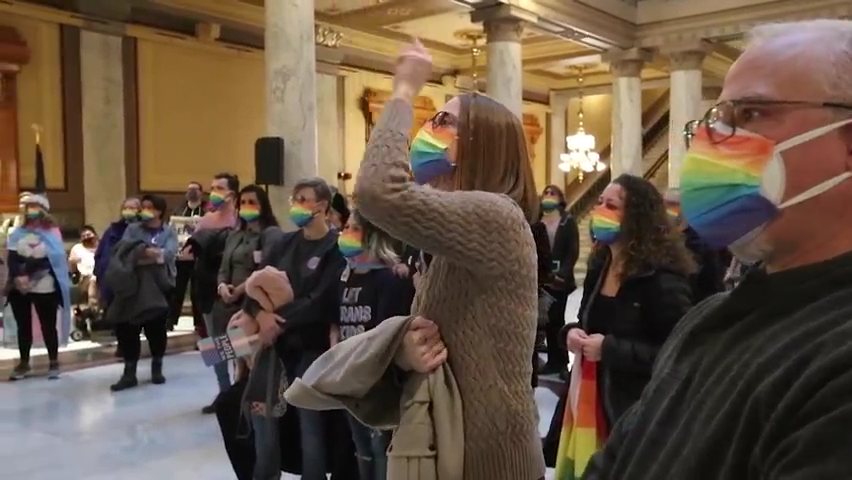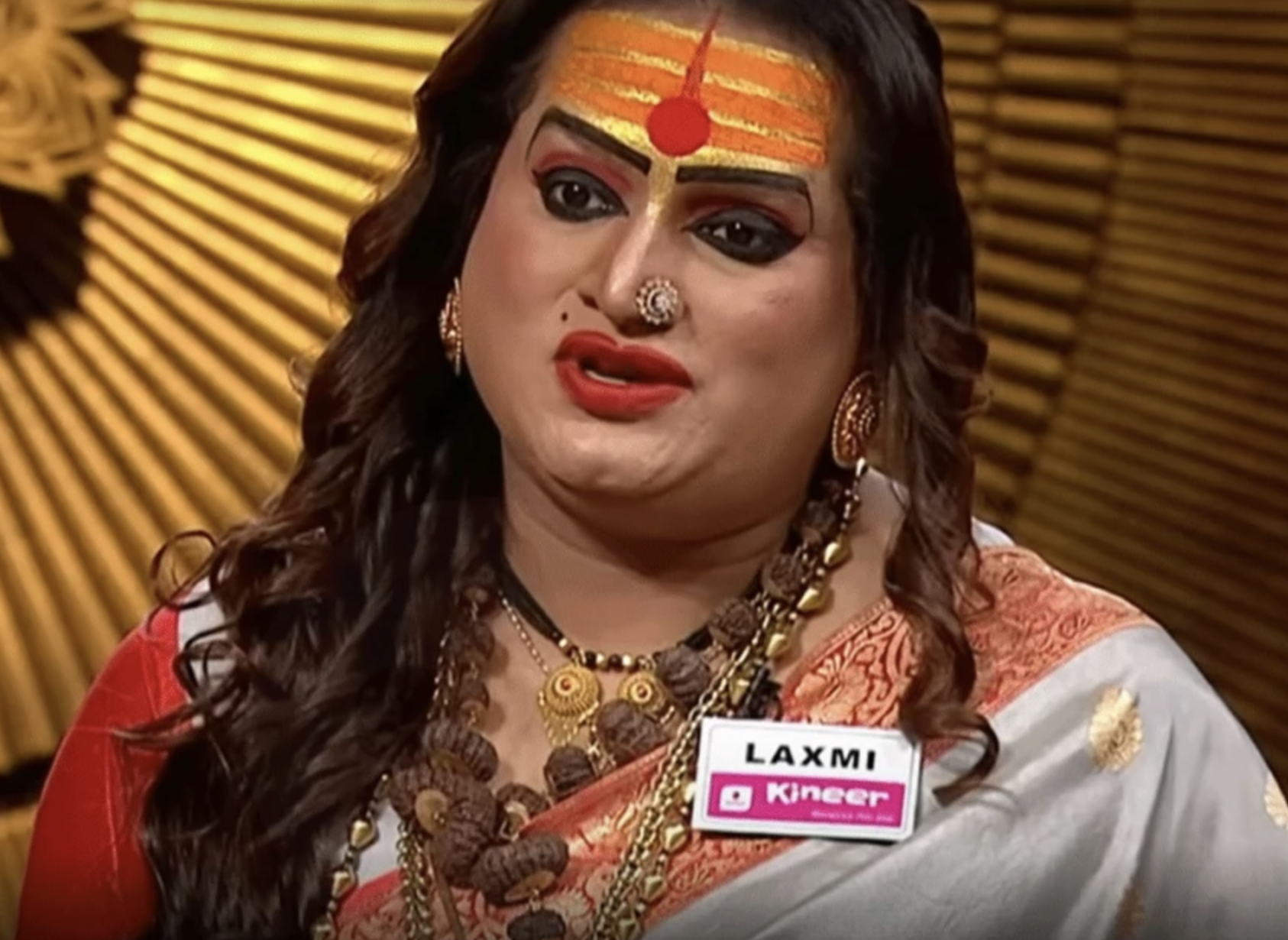
Title IX's future: The rights of transgender students - IndyStar

ACLU protests bill that would ban transgender girls from girls sports
The ACLU of Indiana protests as the House Education committee votes to advance HB 1041, which would ban transgender girls from girls sports teams K-12
Jenna Watson, Indianapolis Star
On a sunny May afternoon, the south lawn of the Indiana Statehouse was dotted with Hoosier children and their families. There was four-square, sidewalk chalk and hula hoops. Kids were laughing and having fun, just being kids.
The adults were laughing and having fun, too. But they were also preparing, stockpiling a little bit of joy to carry them through the next part – the fight.
Nearly 50 years after Title IX was signed into law to prohibit sex-based discrimination in education, Indiana lawmakers passed House Bill 1041 to ban transgender girls from playing girls' sports in K-12 schools. On that May day, lawmakers had convened to override Gov. Eric Holcomb's veto of the measure, paving the way for the law to take effect July 1.
Study Hall: IndyStar's education newsletter, delivering the news you need to your inbox each Monday
This group of parents, advocates and allies were on the frontlines of the fight on a new frontier of Title IX – the rights of transgender kids in schools.
Signed into law in 1972, Title IX prohibits discrimination based on sex in education programs receiving federal financial assistance.
It was born out of Congressional hearings during which women and girls detailed the myriad ways they were discriminated against in their schools on a regular basis. They were taught using textbooks that only portrayed successful men, denied admittance to graduate and professional schools, and funneled into home economics courses and away from vocational education courses.
After the law was passed, it showed a generation of women what was possible – from the locker room to the board room. The achievements born through equality of opportunity were not immediate, though, and have still not been felt evenly.
Every day, Title IX is still violated in classrooms and on campuses nationwide, advocates and legal experts say. There are more than 1,600 open complaints, filed with the U.S. Department of Education's Office of Civil Rights — and those are just the complaints that get filed with OCR. Advocates estimate that far more cases go unreported. For members of the LGBTQ community and for transgender girls, in particular, advocates say there is still much work to be done.
“The question is: what does ‘the basis of sex’ mean and what does discrimination mean?” said Kenneth Falk, legal director of the ACLU of Indiana.
In the not-so-distant past, Falk said, advocates began to litigate that discrimination against someone because of their transgender status was discrimination on the basis of sex.
“Most courts have agreed,” he said, "that it is."
Lawsuits impacting Indiana
The ACLU of Indiana has filed several lawsuits on this very topic, working to establish that Title IX includes transgender children.
In 2019, a federal judge ruled that Evansville Vanderburgh School Corporation violated a transgender high school student’s rights by refusing to allow the student to use the male restrooms, the restrooms consistent with his gender identity.
The court ruled that the district violated both the Equal Protection Clause of the Fourteenth Amendment and Title IX. In his decision, U.S. District Court Judge William T. Lawrence stated that the student, known in court documents as J.A.W., “has pointed to evidence that stands unrefuted that EVSC’s practice could not be stated without referencing sex and that the practice treated transgender students like J.A.W. differently.”
It was consistent with an earlier case.
In 2017, the U.S. Court of Appeals for the 7th Circuit — governing Indiana, Illinois and Wisconsin — ruled in favor of Ashton Whitaker, a transgender student who challenged a Wisconsin school district's policy limiting his bathroom usage.
Whitaker wanted to use the boys’ bathroom, but the school created a gender-neutral bathroom specifically for transgender students, according to court documents. The court found that to be discriminatory.
That decision has a direct impact on Indiana's public schools. When the ruling was handed down, Indiana Department of Education officials said the ruling will "drive guidance" on transgender students' rights in the future.
More recently, the ACLU has filed lawsuits alleging Title IX violations for two transgender students who want to play on the sports teams that match their gender identity.
Indiana's open Title IX court cases
Last year, it argued that the Martinsville Community Schools was unfairly denying a transgender middle school student access to the boys’ bathroom, not letting him participate in boys’ sports and refusing to call him by male pronouns, according a lawsuit filed by the boy and his mother. In court documents, it’s alleged that the school district is violating the federal law known as Title IX by unlawfully discriminating against the student on the basis of sex and the student’s principal is violating the equal protection clause of the Fourteenth Amendment.
In April, a federal judge issued a preliminary injunction to require that the district allow the student access to the correct restroom.
Then, last month, the ACLU filed its latest lawsuit utilizing Title IX to defend the rights of transgender children.
On behalf of an elementary school student and her mother, the ACLU is suing the Indianapolis Public School district over the implementation of a new state law that bans transgender girls from playing on girls’ school sports teams.
“I think Title IX started to be used right away, in terms of discrimination against girls sports for cisgender girls,” Falk said. “In the last 15 or so years, I think, the whole issue of the willingness of people to address transgender issues on a societal level has… been an awakening coming over the last couple of decades.”
“A girl is a girl and gets to do girl things,” he said. “A boy is a boy and gets to do boy things, whether you’re talking about transgender or cisgender.”
Proponents of the law argue otherwise, that a person's sex assigned at birth is what determines the opportunities to which they should have access. The law was written to protect girls, supporters say, and to preserve fair competition.
The Supreme Court hasn’t yet weighed in on how Title IX applies to transgender individuals. Falk said advocates, though, look to a high court ruling in an employment discrimination case for hope.
In a landmark 2020 case, Bostock v. Clayton County, the court held that Title VII of the Civil Rights Act of 1964 protects employees against discrimination because they are gay or transgender. Falk said that it was argued in that case that Congress was not thinking about transgender persons, or LGBTQ persons, when Title VII was written.
“The response was, ‘that’s not the point,’” he said. “It is on the basis of sex. A transgender male is male and a transgender female is female.”
A year after the Bostock opinion, the U.S. Department of Education issued guidance, confirming that it will enforce Title IX's prohibition on discrimination on the basis of sex to include discrimination based on sexual orientation and discrimination based on gender identity.
Looking to the future of Title IX
Hoosiers aren't alone on the frontlines of this fight over who Title IX protects. Laws like HB 1041 and others targeting transgender children have been passed all across the country.
So, while Title IX has, in recent years, been largely interpreted to affirm protections and visibility for LGBTQ+ youth, there is also still work to be done said GLSEN Executive Director Melanie Willingham-Jaggers.
GLSEN is a national organization that focuses on ending discrimination, harassment and bullying for LGBTQ+ students in K-12 schools with education and resources for students and educators. GLSEN has two Indiana chapters – Central Indiana and Greater Fort Wayne.
Willingham-Jaggers said despite the protections under Title IX, “too many LGBTQ+ students are still not safe at school, especially transgender students, students with disabilities, Black and Indigenous students and other students of color.”
“Despite protections under Title IX,” she said, "discrimination has devastating effects on students’ ability to learn and feel safe in school."
Lawsuits, like those pursued by the ACLU and others, help affirm protections for LGBTQ students and define its bounds. But they’re reactive, responding to discrimination that has already occurred.
Willingham-Jaggers would like to see more proactive action.
“There are absolutely actions we can take to increase protections for LGBTQ+ youth, including pressing Congress to pass legislation that aims to protect LGBTQ+ students, like the STOP Bullying Act, the Safe Schools Improvement Act, and the Equality Act,” she said.
GLSEN also urged the U.S. Department of Education to revise its Title IX regulations to “state even more clearly that discrimination on the basis of sexual orientation, gender identity, transgender status, or sex characteristics is sex discrimination and is illegal under Title IX.”
“We want LGBTQ+ students to feel empowered,” Willingham-Jaggers said, "and know that they are protected by Title IX if they face harassment and bullying at school."
Call IndyStar education reporter Arika Herron at 317-201-5620 or email her at [email protected]. Follow her on Twitter: @ArikaHerron.
Call IndyStar education reporter MJ Slaby at 317-447-1586 or email her at [email protected]. Follow her on Twitter: @mjslaby.






























